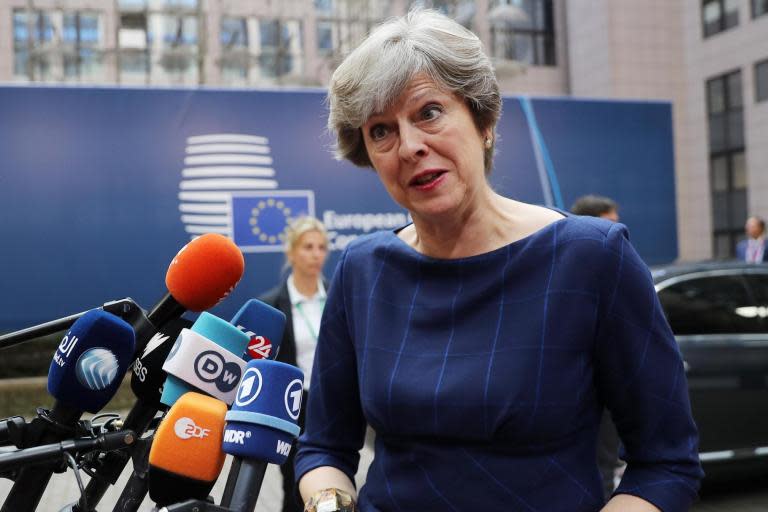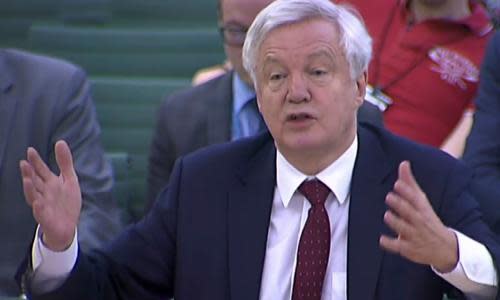'We're deadly serious': Tories turn on May over final say on Brexit deal

Ex-cabinet minister Nicky Morgan has said that she and her colleagues are ‘deadly serious’ about backing plans to give the MPs final say on the Brexit deal.
The senior Conservative MP challenged David Davis over claims that Tory rebels were not serious about backing an amendment to Brexit legislation that would put any vote on the statute book.
The amendment to the European Union Withdrawal Bill has been tabled by Tory former attorney general Dominic Grieve, who said such a move would calm the debate and ‘bring a bit of rationality’ to negotiations.
Britain is ‘screwed’ the Brexit talks
Earlier today, the UK’s former ambassador said that Theresa May has left the country ‘screwed’ after Theresa May opted to trigger Article 50 earlier than anticipated.
As he gave evidence to the Commons Treasury Select Committee, Sir Ivan Rodgers said that the EU was able ‘to dictate the rules of the game’ after Article 50 was triggered without proper consideration for the sequence of talks that would subsequently follow.
It’s a damning indictment for Theresa May, and one that came on a day filled with huge certainty over Brexit and Britain’s relationship with the EU.
Here’s what you need to know.
Sir Ivan Rodgers
Sir Ivan didn’t mince his words when it came to his views on Brexit.
He said: ‘I did say last autumn I would not agree unequivocally to invoke Article 50 unless you know how Article 50 is going to work, because the moment you invoke Article 50, the 27 dictate the rules of the game and they will set up the rules of the game in the way that most suits them.’
‘My advice as a European negotiator was that that was a moment of key leverage, and if you wanted to avoid being screwed on the negotiations in terms of the sequencing you had to negotiate with the key European leaders and the key people at the top of the institutions, and say “I will invoke Article 50, but only under circumstances where I know exactly how it is going to operate.”
A U-turn for David Davis

Brexit secretary David Davis was forced into an embarrassing u-turn after confirming that MPs will be able to vote on a Brexit deal before Britain leaves the EU, contradicting the claims he made only hours previously – which were met with anger.
A statement issued from Davis’ office reads: ‘We are working to reach an agreement on the final deal in good time before we leave the EU in March 2019.
Once the deal is agreed we will meet our long-standing commitment to a vote in both Houses and we expect and intend this to be before the vote in the European Parliament and therefore before we leave.
‘This morning the Secretary of State was asked about hypothetical scenarios. Michel Barnier has said he hopes to get the deal agreed by October 2018 and that is our aim as well.’
A limited Brexit transition period.

Pro-remain supporters of Britain staying in the EU, pose for photographers wearing EU flag masks whilst taking part in an anti-Brexit protest outside the Houses of Parliament in London (AP Photo/Matt Dunham)
In a recent speech in Florence, Theresa May confirmed her intention to seek a transitional period of “about two years” after Britain leaves the EU in 2019.
However, The Guardian claims that the EU are instead more keen on a 20 month transitional period that will end on December 31 2020, the end of their seven year budget.
This will mark the period when Britain will leave the legal structures of the EU.
The EU starts work on Plan B in case of Brexit failure
The European Union has reportedly agreed to start internal talks for the possibility of Brexit negotiations failing to reach a sufficient breakthrough at a key December summit.
In December it is expected that the EU and the UK will be at loggerheads as they discuss key points of contention including trade and citizens rights.
However, The EU reportedly needs to agree there has been ‘sufficient progress’ on the main issues of the U.K.’s departure before negotiations can begin on a transition period.
Theresa May to bring in the head of Vote Leave
Theresa May is reportedly planning to offer a job to the head of Vote Leave after months of huge divisions within the Conservative Party.
Matthew Elliot, who headed up Vote Leave, is reportedly being considered in an attempt to reassure unhappy Conservative members that Brexit is still heading in the right direction.
A Tory source told The Times: ‘We are in discussions with Matthew about a role but nothing has been confirmed yet.’

 Yahoo News
Yahoo News 

